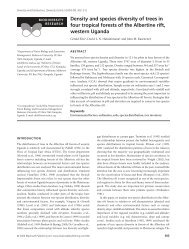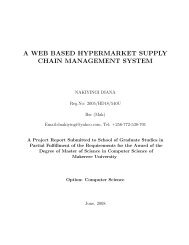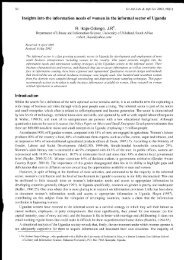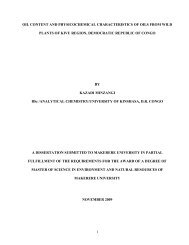THE UNIVERSITY OF LEIPZIG
THE UNIVERSITY OF LEIPZIG
THE UNIVERSITY OF LEIPZIG
Create successful ePaper yourself
Turn your PDF publications into a flip-book with our unique Google optimized e-Paper software.
technologies. This kind of thinking is embedded in the old age traditions relating to natural<br />
resource usage that most of African communities treasured. In fact, most of the provisions in<br />
the African legal regimes governing biodiversity have important clauses of the African<br />
convention.<br />
In regard to the above, the convention provided a framework for many environmental laws in<br />
African countries. However, although the African notion moved away from the globalcentric<br />
notion in an effort to recognize the community and access right in protected areas, many of<br />
the African institutions relating to biodiversity continued to work within their old frameworks<br />
punctuated by the colonial legacies imbedded in the 1900 and 1933 London Conventions on<br />
Biodiversity. 86 In summary, the thinking in the African notion is African, while much of the<br />
practice is Eurocentric. It is also worth noting that, the international treaties have influenced<br />
the development of most of the biodiversity policies and laws in African countries over the<br />
decades. Most of these treaties call for setting aside large tracks of land to keep the flora and<br />
fauna in one place.<br />
This has predicated a move towards conservation ethics that don’t focus primarily on the<br />
integrated management of resource commons principles, based on the recognition of the needs<br />
and perspectives of the local populations living in or near the resource commons. 87 It has also<br />
formed a basis for most wildlife policies in Africa. The other important international treaty<br />
that has become a hallmark for most of the African policies governing biodiversity is the<br />
convention on International Trade in Endangered Species of wild Fauna and Flora (CITES). 88<br />
The current Kenya Wildlife Act which was amended in 1989 is a case in point. The act<br />
banned the trade and hunting of wild game in an effort to conserve and manage rare species of<br />
animals. 89 Generally speaking, the African convention on Biodiversity which forms the<br />
backbone for the African biodiversity conservation continues to be influenced by the<br />
international norms and international biodiversity funding agencies. The African notion was<br />
initially rooted in the heart of community and customary tenureship, but was later derailed<br />
due to the influence of the 1933 London Convention as well as international actors such as the<br />
International Conservation Union. 90<br />
This fact is well collaborated with responses from one key informant, Dr.Sam Kasiki. He<br />
noted that, “the influence of donor agencies is so immense and they continue to play a<br />
significant role in the institutional framing processes in many African countries and Kenya is<br />
no isolated case”. 91 Further still, in reference to the Kenyan Wildlife Act and the Forest Act,<br />
we note that the two acts restrict access to natural resource regimes, such as forests and<br />
national parks. Accordingly, free access to the natural domains under these legal regimes, is<br />
86<br />
Marroquin, M. 1995. Wildlife Utilization: A New International Mechanism for the protection of Biological<br />
Diversity. Law and Policy International Bussiness 26:318-363.<br />
87<br />
The OAU 1968 African Convention Article X (1).<br />
88<br />
Convention on International Trade in Endangered Species of Wild Fauna and Flora. Washington, March 1973.<br />
89<br />
The Kenya Wildlife and Conservation Act, amendment 1989.<br />
90<br />
The Kenyan Gazette, 1977/1978.<br />
91<br />
Key Informant Interview with Dr. Kasiki, Kenya Wildlife Services. 27 Aug 2006.<br />
21






